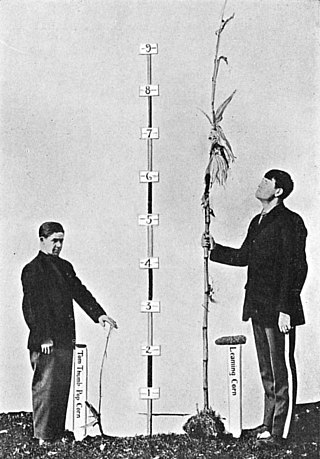
Heredity, also called inheritance or biological inheritance, is the passing on of traits from parents to their offspring; either through asexual reproduction or sexual reproduction, the offspring cells or organisms acquire the genetic information of their parents. Through heredity, variations between individuals can accumulate and cause species to evolve by natural selection. The study of heredity in biology is genetics.
John Philippe Rushton was a Canadian psychologist and author. He taught at the University of Western Ontario until the early 1990s, and became known to the general public during the 1980s and 1990s for research on race and intelligence, race and crime, and other purported racial correlations.

Sociobiology is a field of biology that aims to examine and explain social behavior in terms of evolution. It draws from disciplines including psychology, ethology, anthropology, evolution, zoology, archaeology, and population genetics. Within the study of human societies, sociobiology is closely allied to evolutionary anthropology, human behavioral ecology, evolutionary psychology, and sociology.
Theories of political behavior, as an aspect of political science, attempt to quantify and explain the influences that define a person's political views, ideology, and levels of political participation. Political behavior is the subset of human behavior that involves politics and power. Theorists who have had an influence on this field include Karl Deutsch and Theodor Adorno.

Nature versus nurture is a long-standing debate in biology and society about the balance between two competing factors which determine fate: genetics (nature) and environment (nurture). The alliterative expression "nature and nurture" in English has been in use since at least the Elizabethan period and goes back to medieval French.

Heritability is a statistic used in the fields of breeding and genetics that estimates the degree of variation in a phenotypic trait in a population that is due to genetic variation between individuals in that population. The concept of heritability can be expressed in the form of the following question: "What is the proportion of the variation in a given trait within a population that is not explained by the environment or random chance?"
Twin studies are studies conducted on identical or fraternal twins. They aim to reveal the importance of environmental and genetic influences for traits, phenotypes, and disorders. Twin research is considered a key tool in behavioral genetics and in related fields, from biology to psychology. Twin studies are part of the broader methodology used in behavior genetics, which uses all data that are genetically informative – siblings studies, adoption studies, pedigree, etc. These studies have been used to track traits ranging from personal behavior to the presentation of severe mental illnesses such as schizophrenia.
The dictator game is a popular experimental instrument in social psychology and economics, a derivative of the ultimatum game. The term "game" is a misnomer because it captures a decision by a single player: to send money to another or not. Thus, the dictator has the most power and holds the preferred position in this “game.” Although the “dictator” has the most power and presents a take it or leave it offer, the game has mixed results based on different behavioral attributes. The results – where most "dictators" choose to send money – evidence the role of fairness and norms in economic behavior, and undermine the assumption of narrow self-interest when given the opportunity to maximise one's own profits.
Thomas J. Bouchard Jr. is an American psychologist known for his behavioral genetics studies of twins raised apart. He is professor emeritus of psychology and director of the Minnesota Center for Twin and Adoption Research at the University of Minnesota. Bouchard received his PhD from the University of California, Berkeley in 1966.

The heritability of autism is the proportion of differences in expression of autism that can be explained by genetic variation; if the heritability of a condition is high, then the condition is considered to be primarily genetic. Autism has a strong genetic basis, although the genetics of autism are complex and it is unclear whether autism spectrum disorder (ASD) is explained more by multigene interactions or by rare mutations with major effects.
Research on the heritability of IQ inquires into the degree of variation in IQ within a population that is due to genetic variation between individuals in that population. There has been significant controversy in the academic community about the heritability of IQ since research on the issue began in the late nineteenth century. Intelligence in the normal range is a polygenic trait, meaning that it is influenced by more than one gene, and in the case of intelligence at least 500 genes. Further, explaining the similarity in IQ of closely related persons requires careful study because environmental factors may be correlated with genetic factors.
Psychiatric genetics is a subfield of behavioral neurogenetics and behavioral genetics which studies the role of genetics in the development of mental disorders. The basic principle behind psychiatric genetics is that genetic polymorphisms are part of the causation of psychiatric disorders.

James H. Fowler is an American social scientist specializing in social networks, cooperation, political participation, and genopolitics. He is currently Professor of Medical Genetics in the School of Medicine and Professor of Political Science in the Division of Social Science at the University of California, San Diego. He was named a 2010 Fellow of the John Simon Guggenheim Foundation.
Gene–environment correlation is said to occur when exposure to environmental conditions depends on an individual's genotype.

Behavioural genetics, also referred to as behaviour genetics, is a field of scientific research that uses genetic methods to investigate the nature and origins of individual differences in behaviour. While the name "behavioural genetics" connotes a focus on genetic influences, the field broadly investigates the extent to which genetic and environmental factors influence individual differences, and the development of research designs that can remove the confounding of genes and environment. Behavioural genetics was founded as a scientific discipline by Francis Galton in the late 19th century, only to be discredited through association with eugenics movements before and during World War II. In the latter half of the 20th century, the field saw renewed prominence with research on inheritance of behaviour and mental illness in humans, as well as research on genetically informative model organisms through selective breeding and crosses. In the late 20th and early 21st centuries, technological advances in molecular genetics made it possible to measure and modify the genome directly. This led to major advances in model organism research and in human studies, leading to new scientific discoveries.
A number of studies have found that human biology can be linked with political orientation. This means that an individual's biology may predispose them to a particular political orientation and ideology. Many of the studies linking biology to politics remain controversial and unrepeated.Davies, James. "The Proper Biological Study of Politics". Political Psychology. 4 (4): 731–743. doi:10.2307/3791065. JSTOR 3791065.
Neuropolitics is a science which investigates the interplay between the brain and politics. It combines work from a variety of scientific fields which includes neuroscience, political science, psychology, behavioral genetics, primatology, and ethology. Often, neuropolitics research borrow methods from cognitive neuroscience to investigate classic questions from political science such as how people make political decisions, form political / ideological attitudes, evaluate political candidates, and interact in political coalitions. However, another line of research considers the role that evolving political competition has had on the development of the brain in humans and other species. The research in neuropolitics often intersects with work in genopolitics, political psychology, political physiology, sociobiology, neuroeconomics, and neurolaw.
The interdisciplinary study of biology and political science is the application of theories and methods from the field of biology toward the scientific understanding of political behavior. The field is sometimes called biopolitics, a term that will be used in this article as a synonym although it has other, less related meanings. More generally, the field has also been called "politics and the life sciences".
Moral foundations theory is a social psychological theory intended to explain the origins of and variation in human moral reasoning on the basis of innate, modular foundations. It was first proposed by the psychologists Jonathan Haidt, Craig Joseph, and Jesse Graham, building on the work of cultural anthropologist Richard Shweder. It has been subsequently developed by a diverse group of collaborators and popularized in Haidt's book The Righteous Mind. The theory proposes six foundations: Care/Harm, Fairness/Cheating, Loyalty/Betrayal, Authority/Subversion, Sanctity/Degradation, and Liberty/Oppression. Its authors remain open to the addition, subtraction, or modification of the set of foundations.
In behavioral genetics, the Scarr–Rowe effect, also known as the Scarr–Rowe hypothesis, refers to the proposed moderating effect of low socioeconomic status on the heritability of children's IQ. According to this hypothesis, lower socioeconomic status and greater exposure to social disadvantage during childhood leads to a decrease in the heritability of IQ, as compared to children raised in more advantaged environments. It is considered an example of gene–environment interaction. This hypothesized effect was first proposed by Sandra Scarr, who found support for it in a 1971 study of twins in Philadelphia, and these results were replicated by David C. Rowe in 1999. Since then, similar results have been replicated numerous times, though not all replication studies have yielded positive results. A 2015 meta-analysis found that the effect was predominant in the United States while less evident in societies with robust child welfare systems.






